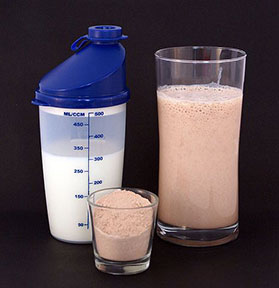
Protein is the basic building block of all cells in the human body. It makes up everything from our organs to our hair and nails. It is the second most abundant molecule in the human body after water. Approximately 20 percent of our body comprises of protein molecules and 65 percent is water. Muscles are one of the highest consumers of protein in our bodies as they constantly tear when being used and need protein to help repair muscle tissue as well as increase muscle mass.
Basic building blocks of protein: Amino Acids

Protein is comprised of amino acids. Our bodies break down the protein we consume into amino acids some of which can only be obtained through varied food sources. Nine of those amino acids are essential for humans and must be obtained by eating various types of foods. Those nine amino acids are tryptophan, methionine, phenylalanine, valine, threonine, leucine, isoleucine, histidine and lysine. There is another set of five amino acids which our bodies can synthesize on their own, namely aspartic acid, alanine, glutamic acid, serine and asparagine. You will notice that most, if not all, protein powders have a list of BCAAs (Branch Chained Amino Acids) that are present in each serving of protein powder and in which percentages, printed on their nutritional labels.
Protein Shakes

Protein shakes come in various forms including protein bars, ready to drink protein shakes, protein powders, etc. The most popular of those protein powders are comprised of whey protein. The reason for which is that whey includes the highest amounts of essential amino acids and BCAAs. Other types of protein powders are usually sourced from casein protein, soy protein, rice protein, egg-white protein, pea protein and hemp seed protein.
Functions of proteins
Proteins play an important role in almost all biological processes. Below is a list of a few of the primary functions:
• Create enzymes which help in biochemical responses
• Create hormones which aid cells in transmitting messages and organize biological functions
• Construct, fortify and heal and/or replace things, such as tissue, hair, collagen and elastin
• Help make you see – a protein called rhodopsin is found in the eye which is utilized for vision
• Carry oxygen in the blood by using a protein called hemoglobin
• Store iron in our liver through a protein called ferritin
• Move and contract muscles with the help of two proteins called actin and myosin
• Create anti-bodies for the immune system
Protein-rich foods
• Meat
• Eggs
• Poultry
• Fish
• Dairy products
• Insects
• Soy products
• Nuts & seeds
• Beans
• Vegetables such as asparagus, cauliflower, broccoli, avocado and Brussels sprouts
• Grains and legumes
Please Note: Eating a lot of processed meats such as sausages, hot dogs and deli meats possibly increase your risk of type 2 diabetes, heart disease and cancer. You also will have a hard time losing weight.
Health suggestions
Deficiency of protein can result in serious complications such as low immunity, inhibited growth, heart and respiratory system failure, and even death. On the other hand, excessive protein consumption can result in calcium resorption from bone as a result of an imbalance of acid/base. Moderation is the rule of thumb for protein intake.
Let us know your favorite protein source in the comments below!